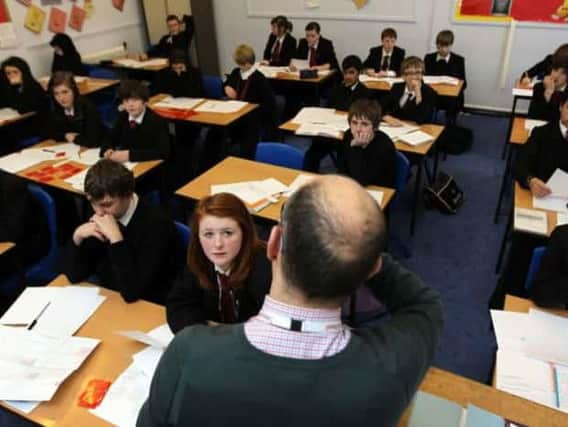Satisfaction with Scotland's schools is falling, finds survey


The Scottish Household Survey found a 15 percentage point drop in those who expressed satisfaction with schools over the last six years contributed to the worst key public services figures since the exercise began around a decade ago.
Satisfaction with schools fell from a high of 85 per cent in 2011 to 70 per cent last year. Last year's figure of 70 per cent also compared unfavourably with the 79 per cent recorded in 2007 when the survey began.
Advertisement
Hide AdAdvertisement
Hide AdSatisfaction with public transport also declined from 72 per cent in 2016 to 69 per cent last year, taking the percentage of those satisfied back to 2007 levels.
Over the last decade the proportion of those surveyed who were satisfied with health increased marginally from 81 per cent to 82 per cent.
But that did not prevent the combined satisfaction with the three key public services (schools, transport and health) falling to its lowest level since 2007.
Combined satisfaction fell from 57 per cent in 2007 to 52 per cent last year. Last year's figure was also a fall from 2011's peak of 66 per cent.
The figures were revealed in the Scottish Government research based on the view of 10,680 people across the country.
Yesterday Conservative MSP Annie Wells said: “The SNP’s failure to manage or invest in our public services is clear for all to see.
“That only half of Scots are actually satisfied with their public services is a truly damning indictment of the SNP’s record in government.
“These findings are entirely consistent with the longest ever waiting times in hospitals, trains that are often delayed and schools that do not have enough teachers.
Advertisement
Hide AdAdvertisement
Hide Ad“The marked decline in satisfaction with local schools is particularly concerning and reflects deep unease among the general public about the state of Scottish education today.
“The sad fact is that as long as the SNP is consumed by civil war and indyref2, it has neither the will nor the ideas to improve public services.”
The Scottish Household Survey 2017 found there here were 98 million passengers carried by ScotRail in 2017-18, an increase on 94 million in the previous year.
State of the nation: A snapshot of Scotland
But train use was found to be more common in higher income households, with 42 per cent of respondents with a household income of more than £40,000 using the train in the past month compared with only 23 per cent of survey respondents with a household income of less than £10,000.
A Transport Scotland document found that the number of journeys made by bus fell by a further 13 million in 2017 to 380 million. Over the past ten years bus travel has fallen by 22 per cent. While just 1.5 per cent of all journeys were made by bike - far below the Scottish Government's 10 per cent target for 2020.
Meanwhile the proportion of households reporting they were managing well financially has increased to over half of households (56 per cent) in 2017 from two in five households (42 per cent) in 1999.
The majority of adults in Scotland (57 per cent) rated their neighbourhood as a very good place to live in 2017.
However, neighbourhood ratings varied significantly depending on levels of deprivation.
Advertisement
Hide AdAdvertisement
Hide AdOnly 29 per cent of adults in the most deprived areas rated it as a very good place to live, compared to 80 per cent in the least deprived areas.
Deputy First Minister John Swinney said: “The Scottish Household Survey is a unique opportunity for people to share their views and experiences and help government to understand the issues affecting communities.
“This year’s results show that many people are managing well financially and the majority are happy with their neighbourhoods and local services but we can see that inequalities remain. We are working to reduce poverty and social exclusion through a range of actions across government including investing £125 million this year alone to mitigate the very worst effects of UK Government welfare cuts and protect those on low incomes. These findings will help us continue to make decisions to shape a fair and inclusive Scotland for everyone."
